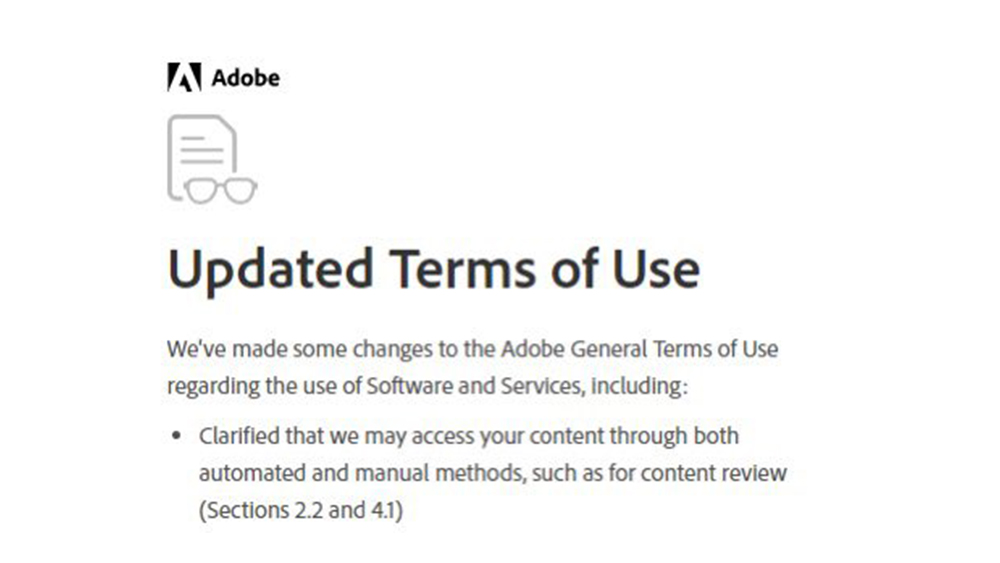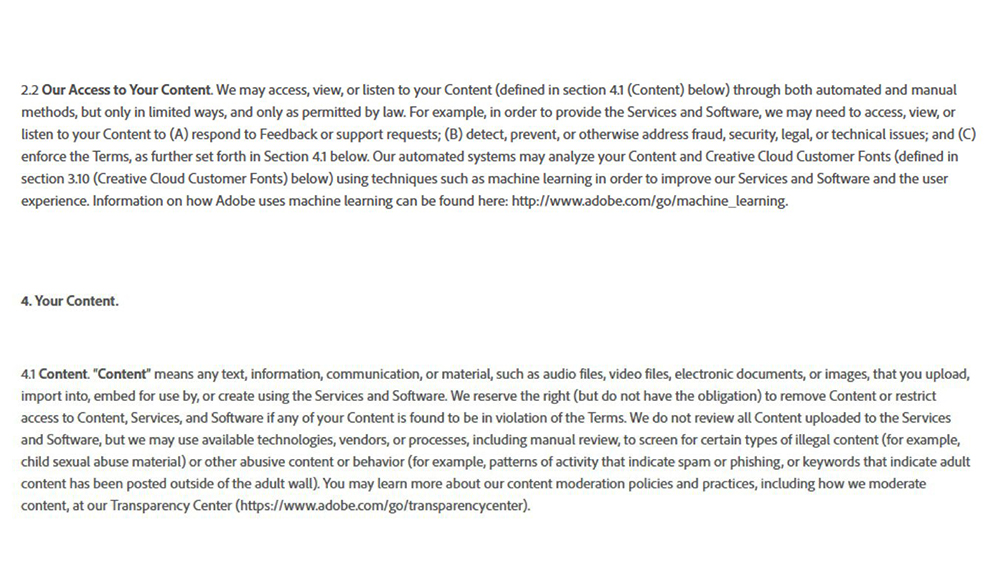Photoshop users have serious questions over new terms of use

It's one of those nuisances that disrupts the working day. You open Photoshop, Illustrator or Premiere Pro to pick up where you left off on a project with a deadline to meet, and you're hit with a message from Adobe that demands you agree to new terms and conditions before you can get on with work.
Many people faced with the situation this morning won't have had the time to make another cup of tea, sit back and read through the small print and will have just clicked through it so they can get down to work. But those who did read the finer details are raising some concerns (see our Adobe software list for a run down of the company's apps). Adobe assures me that nothing has changed in practice, but I can understand users being taken aback.


The updated Adobe terms of use sent out to users include clarification that the company can access users content by both manual and automated methods for several reasons. This is news to some users, who didn't imagine that the software giant would automatically be able to see all their work.
In the updated terms of use, Adobe goes on to clarify that it may "access, view or listen" to content "only in limited ways and only as permitted by law". That includes to review feedback or support requests, to detect or prevent fraud, security, legal or technical issues. It also notes that it has the right to remove content that is found to violate Adobe's terms.
Some of the situations described are understandable, for example in the case of support requests. But there's also a line that says that Adobe can "analyze your Content and Customer Fonts... using techniques such as machine learning in order to improve our Services and Software and the user experience. That one sounds fairly broad.
"I feel like using machine learning for 'content moderation' is a sneaky way of saying 'were installing spyware to train machine learning off everything you do' one person wrote on X. As well as privacy issues and concerns that Adobe may be using users' processes to train AI, some Creative Cloud users are worried that the terms effectively mean that they are breaking their own agreements, including NDAs and WFH contracts, with clients.
Hey, @Photoshop @Adobe, The new agreement you are forcing Photoshop users to sign (even to cancel) requires the user to violate every NDA & WFH contract agreement at every media studio, production, or entertainment company I know of. WTH? @tvaziri @MysteryVFXSuper @vfxlaw pic.twitter.com/wA2oBYlVDgJune 5, 2024
So am I reading this, right? @Adobe @PhotoshopI can't use Photoshop unless I'm okay with you having full access to anything I create with it, INCLUDING NDA work? pic.twitter.com/ZYbnFCMlkEJune 5, 2024
Also, hilarious that I can't even get ahold of your support chat to question this unless I agree to these terms beforehand.June 5, 2024
Users have queried how they're supposed to proceed if they don't wish to accept the new terms since it appears that it's not possible to cancel a subscription without first accepting. Some people have also been questioning whether Adobe's access to user content includes files stored on users' own computers as well as those in Adobe's cloud storage offering. The company assures me that this is not the case.
Daily design news, reviews, how-tos and more, as picked by the editors.
When I reached out to Adobe for clarification, the company said that despite the demand to accept updated wording, nothing has actually changed in its policy. It said: “This policy has been in place for many years. As part of our commitment to being transparent with our customers, we added clarifying examples earlier this year to our Terms of Use regarding when Adobe may access user content. Adobe accesses user content for a number of reasons, including the ability to deliver some of our most innovative cloud-based features, such as Photoshop Neural Filters and Remove Background in Adobe Express, as well as to take action against prohibited content. Adobe does not access, view or listen to content that is stored locally on any user’s device.”
Responding to one user's concerns on X, Scott Belsky, Adobe's chief product officer and executive vice president for Adobe Creative Cloud, wrote: "I agree the summary wording is unclear and I’ve given that feedback to legal.
"The actual TOS are similar to any other modern software provider with cloud features that requires the service be able to 'access' a file – like when a user wants to open it on Photoshop web app, needs files indexed for search purposes, chooses to share a document for review online with a colleague, auto-tagging in Lightroom, or other cloud-enabled capabilities. And many of these capabilities technically require a license 'solely for the purpose of operating' as stated. Adobe has had something like this in TOS for over a decade. But trust and transparency couldn’t be more crucial these days, and we need to be clear when it comes to summarizing terms of service in these pop-ups."
As Scott says, the timing comes at a particularly sensitive moment. The update comes just as other platforms are provoking concerns among artists, including confirmation that Instagram uses images to train AI.
UPDATE 7 June: Adobe has today posted a rare public clarification on X, recognising that it had received "a number of questions" and aiming to provide clarification. Some users have welcomed the response while others say it only adds to the confusion. The company has also published a blog post on the topic.
We recently made an update to our Terms of Use with the goal of providing more clarity on a few specific areas. We have received a number of questions resulting from this update and want to provide some clarity.June 6, 2024

Joe is a regular freelance journalist and editor at Creative Bloq. He writes news, features and buying guides and keeps track of the best equipment and software for creatives, from video editing programs to monitors and accessories. A veteran news writer and photographer, he now works as a project manager at the London and Buenos Aires-based design, production and branding agency Hermana Creatives. There he manages a team of designers, photographers and video editors who specialise in producing visual content and design assets for the hospitality sector. He also dances Argentine tango.
